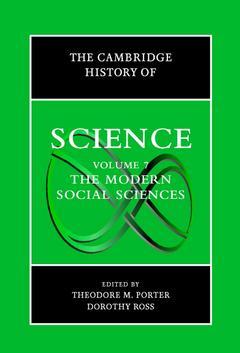Description
The Cambridge History of Science: Volume 7, The Modern Social Sciences
The Cambridge History of Science Series
Coordinators: Porter Theodore M., Ross Dorothy
An account of the history of the social sciences since the late eighteenth century.
Language: English
Publication date: 08-2003
790 p. · 16.4x23.6 cm · Hardback
790 p. · 16.4x23.6 cm · Hardback
Description
/li>Contents
/li>
This volume provides a history of the concepts, practices, institutions, and ideologies of social sciences (including behavioural and economic sciences) since the eighteenth century. It offers original, synthetic accounts of the historical development of social knowledge, including its philosophical assumptions, its social and intellectual organization, and its relations to science, medicine, politics, bureaucracy, philosophy, religion, and the professions. Its forty-two chapters include inquiries into the genres and traditions that formed social science, the careers of the main social disciplines (psychology, economics, sociology, anthropology, political science, geography, history, and statistics), and international essays on social science in Eastern Europe, Asia, Africa, and Latin America. It also includes essays that examine the involvement of the social sciences in government, business, education, culture, and social policy. This is a broad cultural history of social science, which analyzes from a variety of perspectives its participation in the making of the modern world.
1. Introduction: writing the history of social science Theodore M. Porter and Dorothy Ross; Part I. Sciences of the Social to the Late Nineteenth Century: 2. Genres and objects of social inquiry from the enlightenment to 1890 Theodore M. Porter; 3. Social thought and natural science Johan Heilbron; 4. Cause, teleology, and method Stephen Turner; 5. Utopian socialism and social science Antoine Picon; 6. Social surveys in the eighteenth and nineteenth centuries Eileen Yeo; 7. Scientific ethnography and travel, 1750–1850 Harry Liebersohn; 8. History and historicism Johnson Kent Wright; 9. Bringing the psyche into scientific focus Jan Goldstein; 10. Continental political economy from the physiocrats to the marginal revolution Keith Tribe; 11. British economic theory from Locke to Marshall Margaret Schabas; 12. Marx and Marxism Terrell Carver; Part II. The Disciplines in Western Europe and North America since about 1880: 13. Changing contours of the social science disciplines Dorothy Ross; 14. Statistics and statistical methods Theodore Porter; 15. Psychology Mitchell Ash; 16. Economics Mary Morgan; 17. Political science James Farr; 18. Sociology Robert Bannister; 19. Anthropology Adam Kuper; 20. Geography as a social science Marie-Claire Robic; 21. History and the social sciences Jacques Revel; Part III. The Internationalization of the Social Sciences: 22. The sciences of modernity in a disparate world Andrew Barshay; 23. The social sciences in Latin America Jorge Balan; 24. Psychology in Russia and Central Eastern Europe Jaromir Janousek and Irina Sirotkina; 25. Sociology in the Near East Alain Roussillon; 26. Economics, political science, and anthropology in Africa Owen Sichone; 27. The social sciences in India Partha Chatterjee; 28. The social sciences in China Bettina Gransow; 29. The social sciences in Japan Andrew Barshay; Part IV. Social Science as Discourse and Practice in Public and Private Life: 30. The uses of the social sciences Peter Wagner; 31. Managing the economy Alain Desrosieres; 32. Management and accounting Peter Miller; 33. Polling in politics and industry Susan Herbst; 34. Social science and social planning during the twentieth century Peter Wagner; 35. Social welfare Ellen Fitzpatrick; 36. Education Julie Reuben; 37. The culture of intelligence John Carson; 38. Psychologism and the child Ellen Herman; 39. Psychiatry Elizabeth Lunbeck; 40. Gender Rosalind Rosenberg; 41. Race Elazar Barkan; 42. Cultural relativism David Hollinger; 43. Modernization Michael Latham.
© 2024 LAVOISIER S.A.S.




